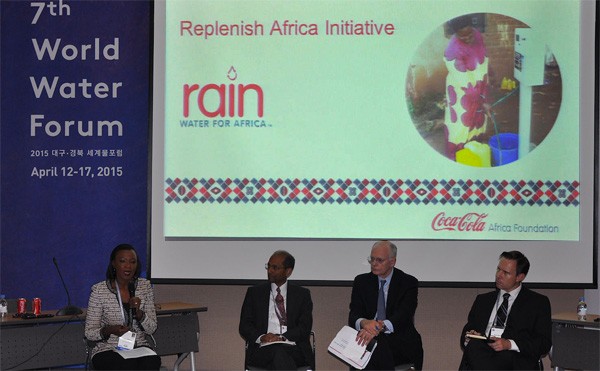Water and sanitation professionals work tirelessly to improve health, promote food security, and boost livelihoods. To further USAID’s knowledge sharing goals, the Water Office holds learning events that present solutions and challenges common to water programs. In Currents, we share the solutions discussed at the events and other venues and news of interest to the water community. Email us at waterteam@usaid.gov if you would like your project to be considered for Global Waters.

World Water Forum Held in South Korea
The seventh World Water Forum took place from April 12-17, 2015, in the cities of Daegu and Gyeongju, South Korea. The largest water-related event in the world, the World Water Forum is a major international conference that takes place every three years and brings together water stakeholders to discuss global water challenges and solutions.
This year’s World Water Forum included members of academia, the development community, government officials, and the private sector from 170 countries. The attendees from USAID consisted of the Agency’s Global Water Coordinator and Deputy Assistant Administrator in USAID’s Bureau for Economic Growth, Education and Environment (E3) Christian Holmes and staff members from three different offices. Mr. Holmes spoke on multiple panels while in Korea including America’s Closing Regional Session on climate change, The Coca-Cola Africa Foundation: The Power of Partnerships through RAIN, the USA Pavilion on the Implementation of USAID’s Water and Development Strategy, and Innovation in Water Smart Agriculture: Working From the Ground Up.
“In 2015, we have a once-in-a-generation opportunity to take coordinated, effective international action to ensure water security and promote better water governance,” said Angel Gurría, Secretary General of the OECD. “I am confident that, with the best evidence at your fingertips, a lot of political will, some financing, and some time, we can deliver better water policies for better lives.”
For more information, visit the World Water Forum website.
Coca-Cola Increases Investment in Replenish Africa Initiative
On April 14, 2015, Ahmet Bozer, Executive Vice President and President of Coca-Cola International, announced the expansion of The Coca-Cola Africa Foundation's (TCCAF) Replenish Africa Initiative (RAIN) at the World Water Forum. TCCAF is pledging an additional $35 million to RAIN, bringing its total investment level up to $65 million. With this new commitment, RAIN will bring safe water and sanitation to 6 million people across Africa by 2020.
RAIN is a public-private partnership led by TCCAF with 140 partners including USAID, the Millennium Challenge Corporation, and Water & Sanitation for the Urban Poor. It currently works in 37 African countries to improve water and sanitation, promote hygiene and health, and empower the continent’s most vulnerable people. Its activities include building a water kiosk and distribution network in Lusaka, Zambia; training local women to lead water enterprises in Rwanda; and improving water services in cities in Kenya, Madagascar, and Mozambique.
“Through the efforts of RAIN, we are reinforcing the incredible progress made to date with our many partners and are pledging to do even more,” said Dr. Susan Mboya, President of The Coca-Cola Africa Foundation. “We must continue the progress made from the Millennium Development Goals to set these economies up for success.”
To learn more, visit the RAIN website.
Securing Water For Food Supports First-Ever Salt-Resistant Potatoes in Pakistan
In April 2015, Pakistanis were thrilled to witness the first-ever harvest of salt-resistant potatoes in the Sindh and Punjab provinces of Pakistan. This new variety will yield an expected 20 tons of potatoes per hectare. The trials of this variety were made possible by funding from Securing Water For Food (SWFF), the USAID Grand Challenge for Development which supports innovations that improve agricultural water management. SWFF is also supported by the Swedish International Development Cooperation Agency (SIDA) and the Dutch Ministry of Foreign Affairs.
The new variety of potatoes has the potential to increase food security beyond Pakistan’s borders. At least one billion hectares of land are affected by salinity, and the world loses at least three hectares of arable land each minute due to salinization. The potatoes, which were developed by Jaffer Brothers, MetaMeta Research, and Salt Farm Texel, thrive in salt-affected areas, do not require freshwater irrigation, and are four times more salt tolerant than regular potato varieties. On the heels of these successful trials, the partners plan to test the potatoes in more locations throughout Pakistan.
To learn more, visit the Securing Water For Food website.
SUWASA Program Holds Closeout Knowledge Forum
One hundred and thirty-nine people from 23 countries gathered from May 11-13 in Kampala, Uganda to participate in the Knowledge Forum of the six-year, $40 million USAID’s Sustainable Water and Sanitation in Africa (SUWASA) program.
The Forum, entitled “Path to Financial Sustainability of Urban Water and Sanitation Services in Africa,” focused on sharing experiences and solutions in the design and implementation of programs aimed at delivering sustainable urban water and sanitation services. The main objective was to provide a platform to discuss how to build momentum and steer the urban water sector towards financial sustainability. Participants included policy makers, chief executives and senior managers of water utilities, regulators, civil society, current and former SUWASA team leads, and USAID representatives.
SUWASA was a regional initiative that launched in September 2009 and was active in nine countries across Africa: Ethiopia, Kenya, Liberia, Mozambique, Nigeria, Senegal, South Sudan, Uganda, and Zambia. The program’s ultimate goal was to improve and expand the delivery of water and sanitation services in urban and peri-urban settings, on a financially viable basis.
For more information on SUWASA, visit the website and watch a short video on the SUWASA pathways.







Comment
Make a general inquiry or suggest an improvement.